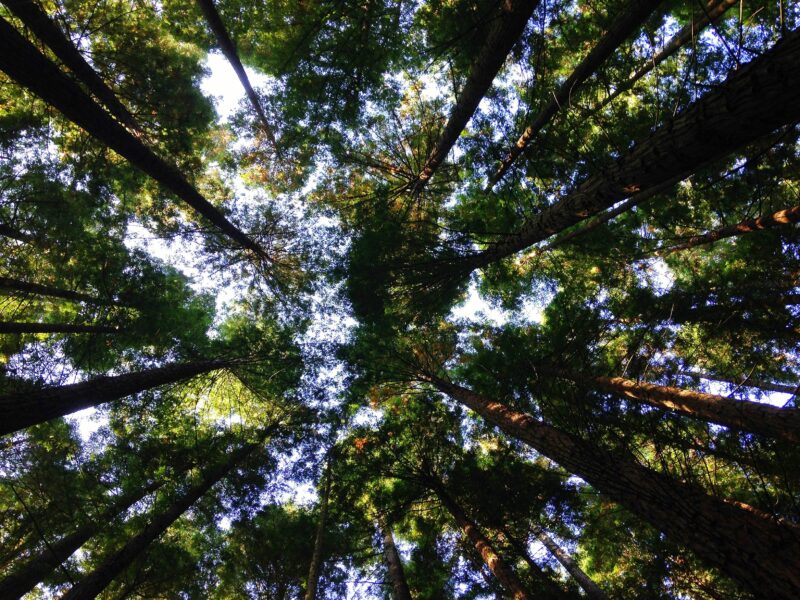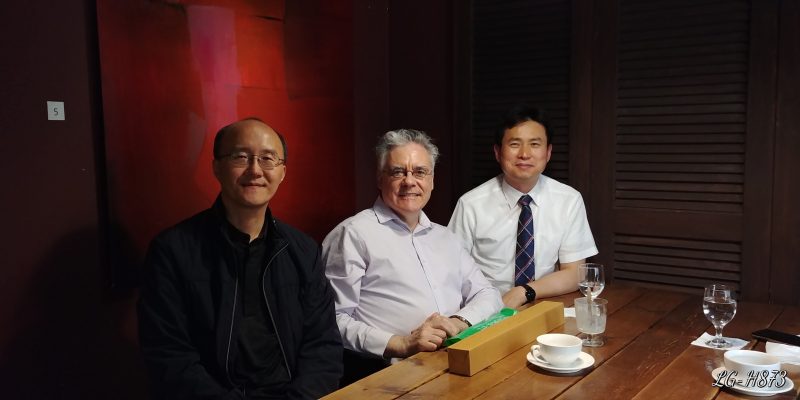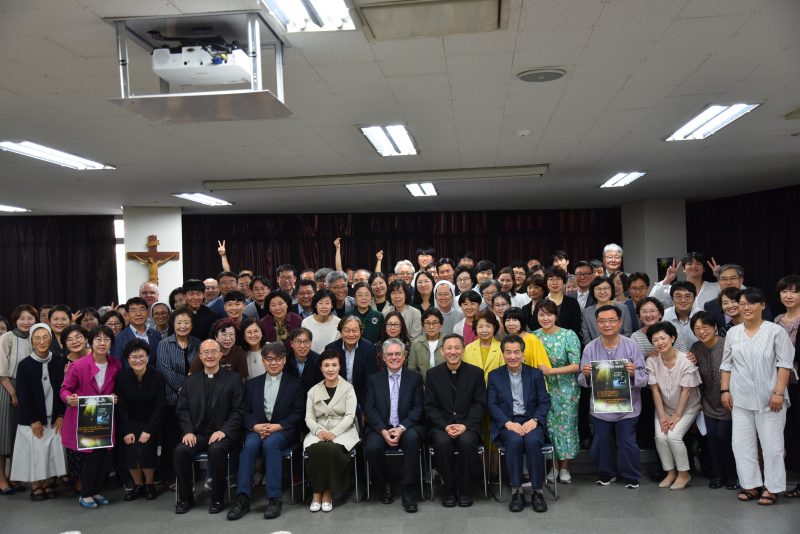A new project from the Regis St. Michael’s Faculty of Theology (RSM) will offer educators the tools needed to help adolescents deal with the growing challenge of climate anxiety.
Climate anxiety – also known by such terms as eco-anxiety, climate grief, or climate trauma – refers to the negative impact climate change can have on mental health. Numerous surveys indicate the experience of worries and fears for the future brought on by climate change is growing and is particularly intense among adolescents and young adults.
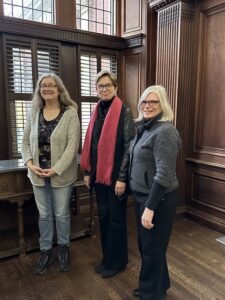
Now, RSM Professors Hilda Koster and Cynthia Cameron are launching Critical Conversations in Catholic Education: Climate Change and Eco-Social Resilience, a series of free workshops and a conference designed to engage educators in a conversation about how best to support adolescents and young adults in the face of a rapidly changing world.
“Young people are caught in a moment of feeling overwhelmed, and feeling hopelessness in the face of it all,” says Koster, who is an Associate Professor of Eco-Theology and the Director of the Elliott Allen Institute for Theology and Ecology. She also holds the Sisters of St. Joseph of Toronto Chair in Theology at RSM.
Climate anxiety “is a spiritual problem, and not just a problem of morals. It’s an existential issue,” she says, noting that the syndrome can result in apathy, isolation, and depression. “It’s hard to feel connected when you are anxious.”
Koster notes that while many Catholic schools now include Laudato Si’, Pope Francis’s groundbreaking encyclical on the environment, in their curriculum, there is a new but growing body of research and literature on climate anxiety that teachers may not be aware of yet. The two professors plan to draw on familiar spiritual resources such as Laudato Si’ (also referred to ‘On care for our common home’), which was promulgated in 2015, while also introducing newer materials specifically addressing climate anxiety.
“We want to help school boards and teachers connect the dots between the ecological, religious, and mental health aspects of this issue,” says Cameron, who is Assistant Professor of Catholic Education at RSM and holds the Patrick and Barbara Keenan Chair in Religious Education. Everyone working in a Catholic school is a religious educator, she notes, and so findings ways to help students develop resilience in the face of climate anxiety touches everyone from the chaplain to English, science and health teachers, for example, through to administrative staff.
The project is designed primarily to address issues emerging in the Grs. 7-12 range, with particular emphasis on the high school years, Cameron explains, noting there is a “confluence of anxiety and depression that begins to increase around the age of 11 or 12.”
While the Critical Conversations workshops will be presented through a Catholic lens, many of the lessons learned will be applicable to all students regardless of faith tradition, she adds.
Doctoral candidate Rosemary Boissonneau, who is also working on Critical Conversations, sees the project being particularly helpful to new teachers. While not the target age of the project, many young teachers are also facing their own climate fears, she says, questioning, for example, the risks their own children may face if climate change is not controlled. These personal worries come as they work with students who are extremely stressed by the topic – one of the factors that can lead to teacher burnout, says Boissonneau, a teacher herself.
The first workshop will be led by Cameron and Koster, focussing on the topic of “Climate Anxiety, Education, and Catholic Social Teaching” In addition, there will be a presentation by teacher and alumna Gabrielle Chan on her research for her Master of Theological Studies thesis on “Laudato Si’, Climate Anxiety and Youth.” Boissonneau will speak on her work as an educator, climate activist with “Fridays for Future” and “The Laudato Si’ Movement,” and a biblical scholar.
This workshop is co-sponsored by the Halton Catholic District School Board and the Dufferin-Peel Catholic District School Board and takes place on Wednesday, February 21 from 4:30-6 pm at St. Francis Xavier Secondary School, 1145 Bronte Street South, Milton, with an online option available.
The second workshop, “Science, Suffering, and Eco-Theology,” will be held on Wednesday, April 17, will include a presentation by Prof. Adam Hincks, S.J., who is Assistant Professor and the Sutton Family Chair in Science, Christianity and Cultures at St. Michael’s. He will be joined by RSM’s Prof. J.P. Fortin, who is Associate Professor of Practical Theology, and doctoral student Deanna Zantingh, whose research area focuses on Indigenous youth suicide and environmental devastation. Sr. Mary Anne Francalanza, fcJ, a science teacher who is working toward a diploma in Theology and Ecology will also be speaking. This second workshop is sponsored by the Durham Catholic District School Board at its Pope Francis Conference Centre, at 652 Rossland Rd. W. in Oshawa. This event will also be offered online.
While the workshops are designed primarily for teachers, the concluding day-long conference will have a broader audience, including students from the Toronto School of Theology and various faculties and departments at the University of Toronto. Youth, Climate Anxiety and Religious Education, which takes place on Saturday, Oct. 5 on campus, will feature Prof. Joyce Mercer, a professor of practical theology and pastoral care at the Yale Divinity School who has written on the topic of children and climate anxiety.
Along with a keynote address, the conference will include panel discussions, opportunities for networking, and tables of information.
“This project is a two-way street,” says Koster, who says that she and Cameron look forward to listening to and learning from the experiences of teachers working with adolescents to further their own work.
The Critical Conversations project is being funded by a Moving Forward in Mission grant from the Association of Theological Schools, RSM’s accrediting body. The professors note that the grant’s stated purpose reflects RSM’s commitment to serve the broader community, offering educational outreach to answer critical issues of the day.
On June 14, 2023, the Collegium of the University of St. Michael’s College committed to fully divest the University’s investments from fossil fuels by the year 2030, or sooner if possible.
The University of St. Michael’s College (USMC) has held no direct investments in fossil fuel companies since 2013, and the Collegium’s decision will complete the process of removing fossil fuel companies from its indirect investments (pooled and commingled funds).
Complete divestment from fossil fuels builds on USMC’s established initiative of investing according to its institutional values. Since 2016 USMC has collaborated with the Shareholder Association for Research & Education (SHARE) to support and encourage more just and humane environmental, social, and governance practices among investees. In 2021, USMC joined a coalition of Canadian universities to launch SHARE’s University Network for Investor Engagement (UNIE), which engages corporations on climate change risks.
“The Collegium’s commitment to full divestment from fossil fuels represents an important next step on a journey this university has been on for over thirty years,” said President David Sylvester. “St. Michael’s has been a forum of ecological thought and practice since the founding of our Elliott Allen Institute of Theology and Ecology in 1991. The Collegium’s decision resonates powerfully with that tradition, and with our university’s vision to be a recognized leader in promoting respectful dialogue and action to advance the care of our common home, as articulated in our strategic plan, St. Mike’s 180.”
Learn more about St. Mike’s sustainability initiatives.
Join Dr. Hilda Koster, the new holder of the Sisters of St. Joseph in Toronto Chair in Theology, at her first St. Michael’s conference November 11 and 12. Learn more about the conference from Dr. Koster’s description below.
- Thursday, November 11: 7 p.m. –8:30 p.m. ET
- Friday, November 12: 8:30 a.m. – 1:15 p.m. ET
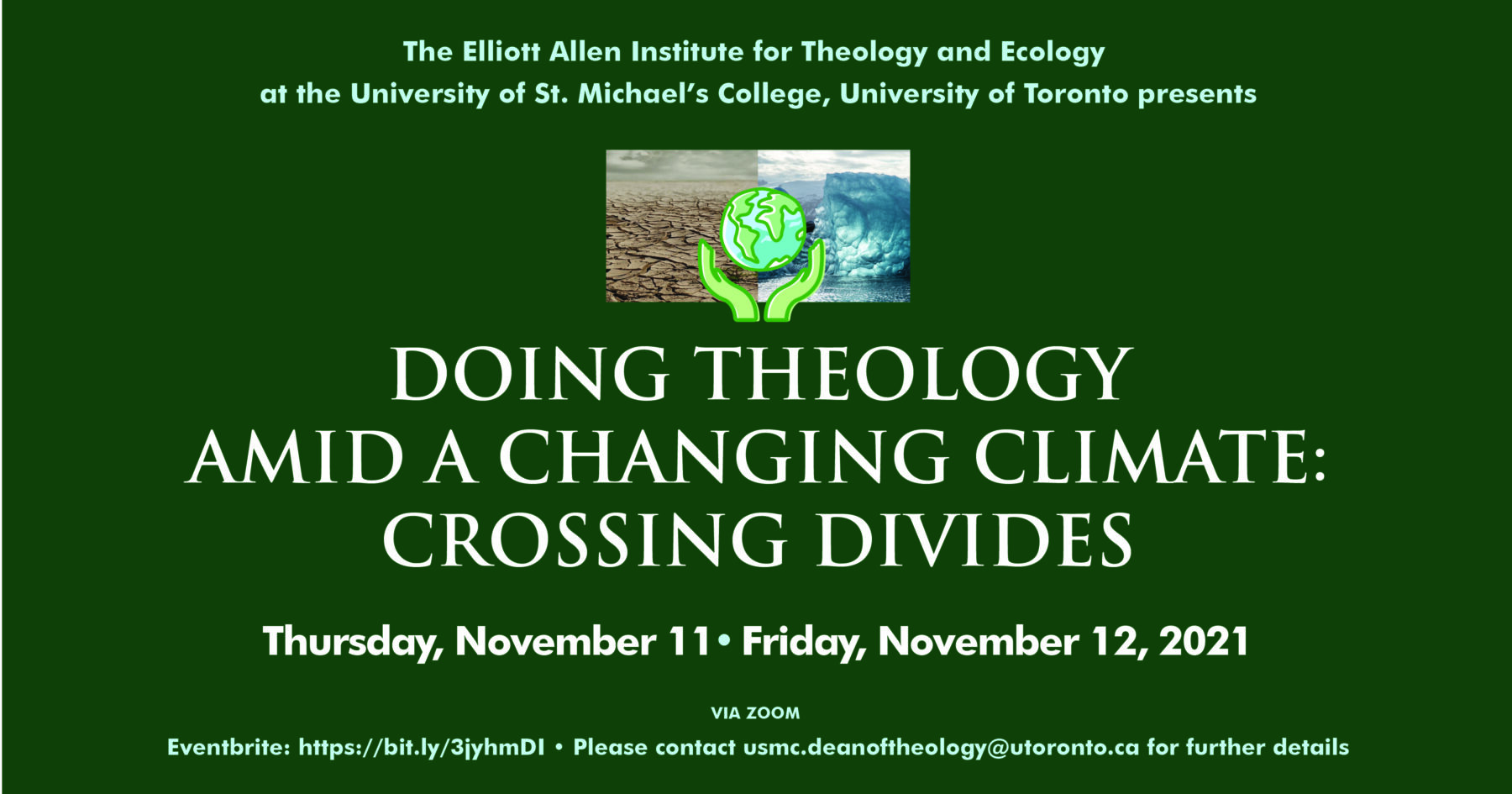
As world leaders gather at the COP 26 UN Climate Change Conference in Glasgow to implement the Paris climate agreement, the web-conference “Doing Theology Amid a Changing Climate: Crossing Divides” explores Christian theology’s contribution to the cultural, social, and spiritual transitions needed. Together with scientists and leaders from other faith traditions, Christian churches and communities have provided common witness on climate change. Yet because climate change is not simply an issue to be addressed but signals a need for a radical change in the way we inhabit a damaged planet, theologians and scientists discuss what more is required at this crucial geo-historical moment.
The speakers and panelists will ask how we can more effectively collaborate across disciplines and align our theology with cosmology and evolutionary science. How can we overcome divisions on climate science in a post-truth world? Which revelations of the sacred will nurture our interdependence with one another and the more than human world? And, as climate change further divides climate privileged and vulnerable communities along lines of race, gender, and ethnicity, how may theologians and community leaders work together to address questions of climate justice?
This conference is hosted by the Elliott Allen Institute for Theology and Ecology at the University of St. Michael’s College (Toronto), a leading interdisciplinary Institute for scholarship and dialogue rooted in the Catholic intellectual tradition.
Thursday, November 11
7–8:30 p.m.
A keynote speech delivered the night before by Franciscan Sr. Ilia Delio of Villanova University in Pennsylvania will set the scene for panel discussions of climate justice, gender justice, climate science and climate anxiety and the Church’s response. (The Catholic Register, Oct. 23, 2021)
Keynote: “Earth’s Fragility and the Crisis of Transcendence: Why Science and Religion Must be Reconciled”
Speaker: Dr. Ilia Delio, OSF Josephine C. Connelly Endowed Chair in Theology at Villanova University
Friday, November 12
Session 1: Climate Justice and Gender Justice: Addressing Inequities and Working across Difference (8:30 – 10:00 a.m.)
To many poor and minority communities, climate change means death and destruction on an ever-larger scale. Women and gender-diverse people are especially vulnerable. Speaking from various contexts and in solidarity with communities in both the global North and South this panel of renowned Catholic women theologians discusses these inequities and injustices with a focus on resource extraction and gender justice.
Session 2: Theology and Climate Science: Addressing Indifference, Fear, and Denial (10:15 – 11:30 a.m.)
To address climate change, theologians and climate scientists need to further engage in dialogue across disciplines. This panel explores the possibilities and challenges for this collaboration. How can climate science inform Christian theology? How can they both challenge religiously motivated climate change denialism? How can theology address fear and deep-seated anxiety about the consequences of climate change? What role do climate scientists see for the wisdom and power of religion and spirituality?
Session 3: Working across Ecclesial and Colonial Divides (11:45 a.m. – 13:15 p.m.)
Despite considerable ecumenical efforts towards a common witness, Christianity remains deeply divided on ethical issues, including climate change. Theologians representing various confessional and ecclesial traditions and communities address the challenges of ecumenical collaboration. Can Catholics come together with other Christians around the vision for climate justice and sustainability that Pope Francis unfolds in the encyclical Laudato si’? Can Christians from the global South and North work together to address issues of climate injustice amidst the enduring legacy of colonialism?
The Vatican has designated May 16–24, 2020 Laudato Si’ Week to mark the 5th anniversary of the completion of Pope Francis’s groundbreaking document Laudato Si’: On care for our common home. (The document was formally signed on May 24, 2015 and released on June 18, 2015.) The global campaign is sponsored by the Vatican’s Dicastery for Promoting Human Development, and is designed to spur Catholics to become more involved in environmental action.
Dr. Dennis O’Hara, who authored the reflection below, edited a book on Laudato Si’ with Matt Eaton and Michael Ross. The book, Integral Ecology for a More Sustainable World: Dialogues with Laudato Si’, brought together scholars from around the world with diverse backgrounds, including Chris Hrynkow, Cardinal Turkson, Brother Guy Consolmagno (Director of the Vatican Observatory), Sue Rakoczy, and John Haught. Drs. O’Hara, Eaton and Hrynkow are graduates of the Elliott Allen Institute for Theology and Ecology at the Faculty of Theology, and Michael Ross is an EAITE doctoral student.
Laudato Si’ Five Years Later
Even before its promulgation on June 18, 2015, the papal encyclical, “Laudato Si’: On Care for Our Common Home,” had created tremendous advance interest. At the time, I was serving as Director of St. Michael’s Elliott Allen Institute for Theology and Ecology (EAITE) and thus was frequently invited to speculate on the possible content of the encyclical, including on a student radio show, at a conference on religion and cosmology at Yale University, and in parishes of both Christian and non-Christian faiths.
Prior to its official release, I was given an advance copy of the encyclical so that I could prepare for the anticipated media attention. Interviews for radio, television, and newspapers punctuated the next several days, to be followed by talks at conferences, for school boards and NGOs, and in many parishes, both in Canada and Korea. This unprecedented interest was echoed in the encyclical’s enthusiastic reception at the 21st Conference of the Parties (COP21) of the United Nations Framework Convention on Climate Change at Paris in 2015, resulting in the Paris Climate Agreement. The encyclical inspired the formation of hundreds of new Catholic organizations to advance its goals, including the Global Catholic Climate Movement (a global network of 900 Catholic organizations) and the Catholic Climate Covenant as well as numerous initiatives of religious orders and the expansion of the work of Catholic NGOs to address an increased concern for our common home. It also spurred the interfaith project Living the Change, and the formation of the Vatican Dicastery for Promoting Integral Human Development. The encyclical continues to be favourably referenced in academic circles among diverse disciplines, including theology, ecology, economics, justice, social studies, healthcare, and more.
With the advantage of five years since its release, a retrospective assessment of Laudato si’ gives a fuller appreciation of its accomplishments. For decades, ecotheologians had acknowledged the Christian teaching that there are two books of sacred revelation—viz., scripture and creation—bringing a renewed focus to exploring the theological and ethical implications of a more sympathetic and scholarly reading of the latter. They had been pioneering a deeper understanding of humanity’s role within the epic of evolution and advocating for a more integrated understanding of the myriad of justice issues related to the ecological crisis. Pope Francis’ first encyclical validated their decades of innovative work.
The call of Laudato si’ to recognize the integral ecology of creation and to engage in conversations of respectful dialogue with diverse voices from all sectors of society, emphasized the intersectionality of ecological, ethical, economic, political, social, gender, and justice issues. Through such efforts, the encyclical articulated a more robust and integrated version of Catholic Social Teaching. Concurrently, it required the conversion of ourselves and our cultures, eschewing a consumerist individuality in preference for the health of the common good and our common home. As the magnitude and urgency of the ecological crisis in its multiple forms became better understood within more disciplines and by more people, the comparable magnitude, complexity, and intersectionality of this conversion also became more apparent.
Nevertheless, such awareness has not spurred an adequate response within either secular or religious institutions. For example, the concentration of greenhouse gases in the atmosphere continues to increase while the vitality of life on Earth declines despite generally universal calls for a vigorous reversal of both. This past November, the retiring president of the U.S. Conference of Catholic Bishops described climate change as “important but not urgent.” Yet as Msgr. Bruno Marie Duffe, secretary of the Dicastery for Promoting Integral Human Development warns, ” the alarming speed of climate change caused by human behavior and the choices we make threaten the very survival of species, water and air quality as well as food security. These are huge challenges…and the Paris Agreement is an absolute minimum and in fact does not go far enough.” Despite fine rhetoric, few nations are likely to reach the pledges they made with that agreement.
Laudato si’ continues to challenge this delinquency among nations and within its own Church. Its observations, assessments, and calls for action often serve as a standard against which efforts are measured or as an interlocutor that nurtures or guides responses to global crises. The contrast between the analyses and aspirations of the encyclical, and the anemic responses and sclerotic leadership still too often seen, shows that while the encyclical has had significant impact, the conversion it prescribes is far from realized. Like every good encyclical, Laudato si’ needs to be read and re-read to better understand and apply its message.
Professor Emeritus Dennis Patrick O’Hara is the former Director of the Elliott Allen Institute for Theology and Ecology at the St. Michael’s Faculty of Theology, where he taught from 2002-2019, and directed many theses in ecotheology and ethics. He was also an associate member of the graduate faculty at the School for Environment at the University of Toronto. In addition to teaching courses in ecological theology, spirituality, ethics, and sustainability, he has worked for the World Health Organization and Health Canada researching and preparing policy positions. He regularly delivers both popular and academic lectures in Canada and the USA but has also lectured in Europe and South Korea. Prior to becoming a theologian, he practised as a chiropractor and naturopathic doctor, and taught at colleges of both of those professions.
Moments of Grace and COVID-19
Basil of Caesarea, in Rule LV: Whether the Use of Medicinal Remedies is consistent with the Ideal of Piety, instructs that a serious illness can be sufficiently disruptive to our normal patterns of living that it can force us to consider the circumstances that led to our illness and to re-evaluate our choices so that we can once again align our life with the telos of God’s creation. This opportunity can be identified as a moment of grace, on a religious level.
Thomas Berry notes that moments of grace can also occur on cosmic and historical levels, such as the dispersal of primary element via the explosion of stars or the development of photosynthesis. Throughout the 13.8-billion-year history of the universe, change occurs when systems reach the most tension that they can creatively endure. At that point, systems evolve irreversibly by transforming into a new level of order and complexity by resolving the dangerous tension in an unprecedented way. In many respects, we are at such a moment, in part due to the COVID-19 pandemic and in part due to an ecological crisis magnified by climate change.
The people who are suffering the most due to the ecological crisis with its complex interwoven array of hardships will undoubtedly be least able to withstand the consequences of the COVID-19 pandemic with its threats to personal health and reduced access to supportive infrastructures. Both the ecological crisis and the COVID-19 pandemic are anthropogenic crises on a global scale, and both require a commensurate response. This pandemic has demonstrated the enormous actions we will take when we decide to act for the common good as a single Earth community. Despite decades of exasperating delay to curtail climate change, when faced with this pandemic, nations rapidly instituted measures to restrict travel, pause economies, enforce physical distancing, and impose domestic isolation. Perhaps such a collective and purposeful response could become a rehearsal for addressing Earth’s ecological challenges as we creatively seek ways of being that are mutually enhancing for us and the rest of the Earth community.
Pope Francis, in an interview with Austen Ivereigh from the University of Oxford concerning this pandemic, noted that the great uncertainty of this present moment is “a time for inventing, for creativity” because “every crisis contains both danger and opportunity: the opportunity to move out from the danger” through conversion, including “the decisive step to move from using and misusing nature.” Ecotheology reminds us that we have a common origin and share a common sacred story with all of Earth. We need to reframe our choices to better align with the creative dynamics and the telos of that story for we will go into the future as a single Earth community or not at all.
Read other InsightOut posts.
The itinerary for Dr. Dennis Patrick O’Hara’s final working trip before his retirement begins this summer couldn’t haven been more appropriate. The Faculty of Theology professor returns this week from South Korea, where he offered a congratulatory address to the founding meeting of the Korean Thomas Berry Association (KTBA).
It’s a trip that has brought the ecotheologian full circle, as Dr. O’Hara was first influenced by Berry’s writings while working on his graduate studies, leading him to specialize in theology and ecology. Berry’s influence and inspiration have remained strong throughout Prof. O’Hara’s teaching career, and over the years he has emerged as a world leader in Berry’s work, teaching hundreds of students and supervising multiple theses in ecotheology and ethics. Many of those students come from South Korea, where Berry has a strong following, expressly because of Dr. O’Hara’s reputation and research.
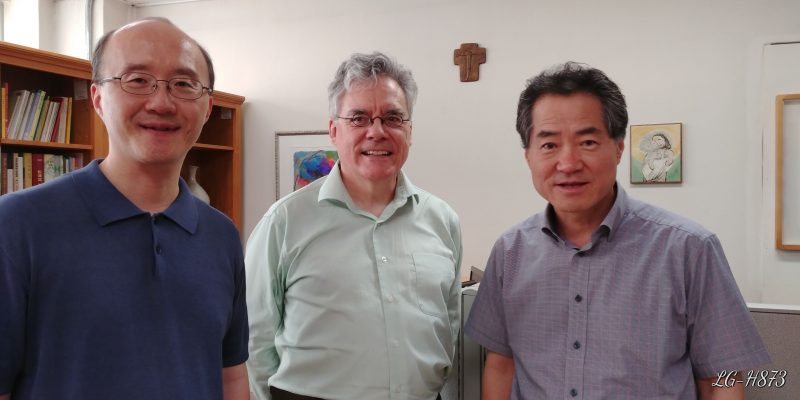
Dr. Berry (1914-2009) was a Passionist priest strongly inspired by French philosopher Teilhard de Chardin. He called on science, Judeo-Christian tradition and a wealth of wisdom from various spiritual traditions to propose ways in which to better understand and serve ecological consciousness.
Dr. O’Hara points to the new Berry association’s mission statement to explain the resonance Berry has with many Koreans. The statement notes not only that Fr. Berry’s work can offer “a new vision to Korean society which is suffering the side effects of industrialization,” but also that his “thought, because of the significant influence of Asian philosophy, is readily understandable in the Korean context.”
As Koreans have come to know Dr. Berry’s thought, often that introduction – and then further education — have come via Dr. O’Hara and his work as director of the world-renowned Elliott Allen Institute for Theology and Ecology (EAITE). Founded here at the Faculty of Theology by Passionist Fr. Stephen Dunn, the EAITE is an interdisciplinary institute that brings together various branches of theology – e.g., ecospirituality or gender justice – with science and humanities in ways to benefit both people and the rest of the planet. Dr. O’Hara succeeded Fr. Dunn as director of the institute in 2001 and he has remained a key influence as the EAITE has continued to grow as the foremost place to study the thought and implications of Dr. Berry’s work.
“We not only teach (Berry’s) work but give it a solid theological foundation and interpretation,” Dr. O’Hara says simply. “This is unique among the centres that study Tom’s works.”
At a traditional Korean meal following the launch of the KTB, Bishop Timothy Yu Gyeong Chon, social ministry vicar for the Seoul Archdiocese, chatted with Dr. O’Hara to let him know not only that he’d met Dr. Berry once but that he’d also attended one of O’Hara’s classes while visiting Toronto. Then he sang the praises of the EAITE.
While in Seoul to help launch the local Berry association, Dr. O’Hara also delivered a talk to 50 seminarians at the Catholic University of Seoul, and another sponsored in part by Kyung Hee University. He also met with many of his former students and their associates, discussing local environmental concerns.
Dr. O’Hara’s significant profile is all the more impressive given that ecotheology is his second career. Prior to theology, he was a chiropractor and naturopathic doctor, both as a practitioner in private practice as well as an educator at colleges for each of these professions. He has also served as a consultant and facilitator for the Natural Health Products Directorate of Health Canada, drafted a description of the naturopathic profession for the World Health Organization, and written the summative report for the 2006 World Health Organization International Consultation on Phytotherapy held in Milan, Italy.
Today, Dr. O’Hara is also an associate member of the graduate faculty at the School for the Environment at the University of Toronto where he has co-taught courses on the environment and health. For 10 years, he was a core faculty member of the certificate programme in Corporate Social Responsibility at the University of St. Michael’s College.
He regularly delivers popular and academic lectures in Canada, the United States, and Korea on ecotheology, ecospirituality, ecoethics, and integral ecology and human health.
Two days before his retirement starts, Dr. O’Hara will facilitate a special screening and discussion of An Ecology of Mind: A Daughter’s Portrait of Gregory Bateson, an event that’s part of an international conference on “Media Ethics: Human Ecology in a Connected World” hosted in partnership with the EAITE and the University of Toronto Faculty of Information. The screening and panel discussion, including an interview with Nora Bateson, takes place June 28 at 7:30, at the McLuhan Centre, 39A Queen’s Park Crescent E.
Dr. O’Hara retires from the Faculty of Theology June 30 of this year. He will be missed!

